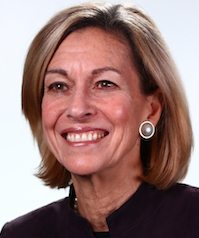How She Got There: Micho Spring’s Path to Becoming Chair of Global Corporate Practice and New England for Weber Shandwick

 Take a young woman coming of age in the 60s, when many careers were closed to her gender. Mix in political awareness from having fled communist Cuba as a child and add courage and flexibility from forging a new life with her family in New York. What you get: a college dropout, a 31-year-old deputy mayor of Boston, a top executive at one of the largest communications firms in the world—as well as a Massachusetts Conference for Women Board member.
Take a young woman coming of age in the 60s, when many careers were closed to her gender. Mix in political awareness from having fled communist Cuba as a child and add courage and flexibility from forging a new life with her family in New York. What you get: a college dropout, a 31-year-old deputy mayor of Boston, a top executive at one of the largest communications firms in the world—as well as a Massachusetts Conference for Women Board member.
In other words, you get Micho Spring, whose name ought to be under “maverick” in the thesaurus. Be inspired by the most unconventional career path of Weber Shandwick’s chair of global corporate practice and New England and the lessons she learned along the way:
Initial Dream Job
“At the time I went to Georgetown, women were not allowed in the College of Liberal Arts. So my idea was to be an interpreter for the United Nations. I was bilingual—I left Cuba when I was 10—and I was going to major in Portuguese and minor in French.”
Summer of a Lifetime
“After a summer internship at the Metropolitan Museum of Art didn’t come through, I walked into the campaign headquarters for John Lindsay to volunteer. He was running for re-election as New York City mayor, and I was sent to the South Bronx when they found out I spoke Spanish. I discovered that political campaigns are true meritocracies: you can rise very quickly if you work hard and are able. At 19, I became the administrative director for the Bronx, overseeing all the campaign’s operations there.”
Proverbial Fork in the Road
“When the summer ended, I didn’t want to leave New York, even for France, where I had planned to study my junior year. I was committed to re-electing Mayor Lindsay and to his crusade to save cities. I decided to follow my passion, which I’ve come to see is what people should do especially when they’re young…. And when Lindsay won, I joined his administration. Cities were cauldrons for incredible social upheaval—the women’s movement, race relations, anti-Vietnam protests. It was an exciting time to be in city government.”
The Non-Linear Path Taken
“I had been taking night courses in urban studies at Columbia, so when Lindsay decided not to run for a third term, I thought I would finish my college degree. Georgetown, though, said I would have to pick up where I left off, while Columbia said they would give me a degree after one more year. But I had a boyfriend who suggested I make my case for admission to Harvard’s Kennedy School of Government, and they said they would take my four years working in government as the equivalent of the credits I was missing and award me a master’s in public administration if I stayed two years. I seized the opportunity. It was the times I lived in—I highly recommend four years of undergraduate studies—but I still believe in not being bound to a linear path. In fact, I believe in providing employees blue sky and not being strict about the course to promotion.”
The Call of Boston’s City Hall
“After Harvard, I was asked to join the administration of Kevin White, who was another young liberal mayor working to redefine city government. I never meant to leave New York, but being part of an administration that was transforming Boston—and did—into the world-class city it is today has been one of the great privileges of my life. I was given such incredible opportunities at a young age, and by the time I was 31, I was deputy mayor.”
Switching to the Business Track
“I didn’t want to lobby or do anything related to government when I left it, so I took a job running a small telecommunications firm. My six years there were the equivalent of earning a business degree. I learned a lot, but I wasn’t using all my skills and strengths. I was ready to go when Sawyer Miller Group, the strategic communications firm I had hired to run Mayor White’s last election, recruited me.”
24 Years and Counting at the Same Firm
“My role has evolved over the years, just as Sawyer Miller has evolved into what is now Weber Shandwick and the communications business itself has evolved from top-down, control-the-terms-of-the-debate public relations to constituency building and engagement in a social media environment. I’ve been offered opportunities both to return to government and to join other agencies and companies, but I’ve always liked my current position better. You don’t have to change companies to grow or be an agent for change. Also, the value of working with the same core group of talented folks cannot be overstated.”
Final Career Advice
“It’s incredibly important to imagine your career and to have a plan. But be flexible about changing the plan—and always be looking around corners for opportunities to stretch. Think big. Reach high. Don’t assume there are obstacles and constraints. Test and challenge them.”